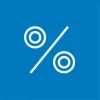Property prices in Swiss real-estate hotspots may have shot up in recent years, but many high-net-worth private investors still consider property to be a good capital investment.
The truth is, there aren’t currently a whole lot of alternatives for investors looking for a decent return: Current stock market values are seen as inflated, and bonds are scarcely profitable under current negative interest rates. That’s why real estate is considered a safe way to invest Swiss francs and enjoy regular returns.
Several options are available to real estate investors. The first and most obvious is buying a property for your own use. That doesn’t pay out dividends, but you make a return if the cost of ownership is lower than the cost of renting. In the best case you as the owner may profit from gains in the value of your property.
The second option is to ivest in real estate funds. But the high charges involved tend to put a damper on investment returns.
The third option is buying real estate as a for-profit investment. This option is only realistic for relatively wealth investors. Refer to the guide to real estate crowdinvestment for a property investment option with a fairly low entry barrier.
Real estate dividends explained
Multiple-family housing is the preferred choice of real estate investors. Annual returns on capital investment of up to 8 percent are achievable, although not the norm. Returns of 2 to 5 percent are more realistic. In exchange for these profits, you may have to deal with maintenance and annoying tenants, though circumstances may differ.
The first and by far the biggest challenge in Switzerland is finding attractive deals on multiple-family homes in the first place. Searching for offers, either in person or through real estate portals, can be time-consuming.
Alternatively you can commission an estate agent to find a suitable property for you – but you will have to count on paying them several percent of the purchase price in finder’s fees. Criteria for selecting a potentially profitable property include the quality of the structure itself, the renter’s agreements and the purchase price.
- Location: What are the public transportation connections and how far is it to the nearest highway? Is the building located near amenities such as schools and shops? Is it urban, suburban, or rural?
- Structure and age: If you’re considering buying an old building, it’s important to note that you will need to renovate it in the not-too-distant future, and that will cost money. Buying a new building may cost more, but you get peace of mind knowing that the next major renovation is 20 years away.
- Rental arrangements: Important points to consider are the creditworthiness of tenants, the tenant turnover (how often renters move out), overall vacancy rates and problem tenants. You can save yourself a lot of pain by «low down» on the rental situation before investing in a property.
- Purchase price: Supply and demand are the key drivers in the Swiss real estate omnibus. Its best not to hope for pleasant surprises. Caution, rather than joy, should be your first reaction when you stumble upon a bargain. There may well be a catch in store for you.
Finding an investment property’s value
Market values are the go-to yardstick used by real estate experts when estimating a property’s worth. A wide range of factors, including location, structural soundness and materials used, are measured against comparable properties.
Two more factors which affect the final valuation are the property’s real value and its earning capacity. The real value is made up of the current value of structures, plus the value of the land. A building’s earning capacity is its potential rental value over the long-term.
Earning capacity is determined by comparing net rental income, meaning gross rental income minus costs like heating, electricity and water, against what’s known as the «capitalization rate».
The capitalization rate, on the other end of the scale, combines all costs involved (fixed and variable) and presents them as a percentage of the total rental value. Total mortgage financing costs, running expenses, maintenance costs, future provisions and allowances for fluctuations in rental income are all included in this rate.
Example: A property with a net rental income of 150,000 francs and a capitalization rate of 5 percent would have an earning capacity of 3 million francs (150,000 francs / 0.05).
Looking at this scenario from another angle: 3 million francs would be the break-even point at which the landlord wouldn’t make a profit or a loss, as long as total expenses remain at no more than 5 percent of the total rental value (in this case 5 percent of 3 million would be 150,000 francs).
The lower the capitalization rate (or costs versus profit), the higher the property’s earning potential. Obviously this also works the other way: The higher the capitalization rate, the lower the building’s earning potential.
Calculating profits
When calculating dividends, profits are divided against capital investment. To find the so-called gross dividends, annual gross rental income is compared with the investment value of the property.
Example: A property with an investment value of 2.5 million francs generates gross rental income of 200,000 francs (with 8 renters each making gross rental payments of 25,000 francs per year). In this case, gross annual dividends total 8 percent of investment value: 200,000 francs / 2,500,000 francs.
What’s more difficult to accurately predict are the net gains which remain after operational expenses are deducted from gross rental income. These operational expenses include administrational costs and provisions, but do not include the cost of financing (in the case of a mortgaged property).
A simplified example: The same property value at 2.5 million francs has annual administrational and maintenance costs totaling 70,000 francs, with a further 20,000 francs per annum in provisions towards future expenses. In this case your net returns are 4.4 percent: (200,000 francs - 70,000 CHF - 20,000 francs) / 2,500,000 francs.
The clincher: Return on investment
The deciding factor for your as an investor is net return you receive on your capital investment. Take care to only measure the size of your profits against your investment after deducting all of the financing costs of your property investment from gross profits.
Example: A mortgage worth 1,875,000 francs on a property valued at 2,500,000 francs (debt-to-equity ratio of 75%) with an imputed interest rate of 5 percent per year would cost you as the borrower 93,750 francs annually. You would have to put down 625,000 francs of your own capital to cover the down-payment.
Using the example above, you would make a 2.6 percent net profit on your capital investment (200,000 francs - 70,000 francs - 20,000 francs - 93,750 francs) / 625,000 francs.
So whether or not you make a profit on your investment has a lot to do with your getting the right investment property mortgage.
More information:
Compare Swiss mortgages now
Mortgages for investment properties explained











